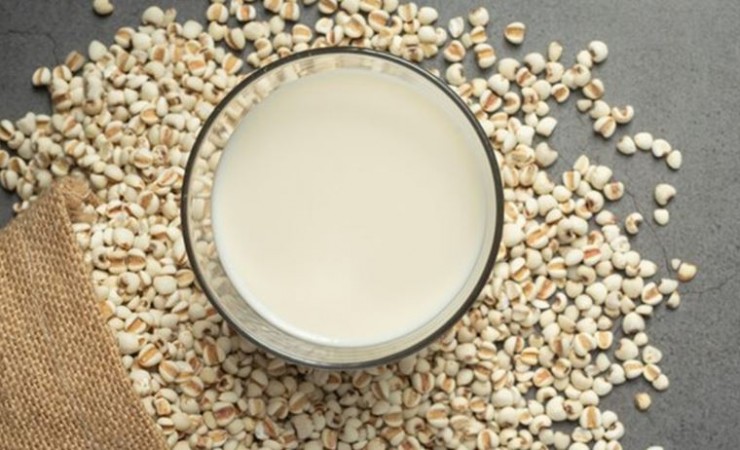
Millet is a type of grain with small seeds that is grown and consumed worldwide. It is better known as bajra in India. In India, millet is enjoyed in various forms such as roti, porridge, and rab. However, did you know that milk can also be made from this whole grain? This serves as a dairy-free beverage option, rich in protein, various vitamins, and minerals. Moreover, it is gluten-free, making it a better alternative for those on dairy-free, lactose-intolerant, and vegan diets.
There are several types of millet milk available, including bajra milk, proso millet milk, foxtail millet milk, and browntop millet milk. However, unlike almond or soy milk, millet milk may not be as widely used or readily available in the market.
The taste and texture of millet milk differ slightly compared to other dairy products. Some people describe its taste as earthy or nutty, resembling almonds. While most people can consume millet milk without any issues, some may experience digestive discomfort. Therefore, it is advisable to gradually introduce millet milk into your diet and observe your body's reaction to it.
Benefits of Drinking Millet Milk:
Nutrient-Rich Composition of Millet Milk:
Millet milk boasts a nutrient-rich composition, making it a valuable addition to a balanced diet. It contains essential vitamins such as vitamin A, vitamin B-complex (including thiamine, riboflavin, niacin, and folate), and vitamin E. These vitamins play crucial roles in various bodily functions, including maintaining healthy vision, supporting energy metabolism, and promoting cell growth and repair.
Moreover, millet milk is a good source of minerals like calcium, magnesium, phosphorus, and potassium. Calcium, in particular, is vital for bone health, muscle function, and nerve transmission. Magnesium supports heart health, regulates blood pressure, and aids in muscle and nerve function. Phosphorus contributes to bone strength and energy metabolism, while potassium helps maintain fluid balance, muscle contractions, and nerve signals.
Additionally, millet milk contains antioxidants such as phenolic compounds, flavonoids, and tocopherols, which help neutralize harmful free radicals in the body and reduce the risk of chronic diseases such as cancer, heart disease, and inflammation.
By consuming millet milk, individuals can benefit from its nutrient-packed profile, ensuring adequate intake of vitamins, minerals, and antioxidants necessary for optimal health and well-being.
Gluten-Free Nature of Millet Milk:
One of the key advantages of millet milk is its gluten-free nature, making it suitable for individuals with celiac disease, gluten sensitivity, or wheat allergies. Celiac disease is an autoimmune disorder characterized by an intolerance to gluten, a protein found in wheat, barley, and rye. Consuming gluten-containing foods triggers an immune response in individuals with celiac disease, leading to inflammation and damage to the small intestine.
For individuals with celiac disease or gluten sensitivity, adopting a gluten-free diet is essential to manage symptoms and prevent complications. Millet milk serves as a safe and nutritious alternative to dairy milk, providing a source of calcium, vitamins, and minerals without the risk of gluten contamination.
Moreover, individuals following a gluten-free diet for other health reasons or personal preferences can incorporate millet milk into their daily routine, diversifying their beverage options while adhering to their dietary restrictions.
By offering a gluten-free alternative, millet milk contributes to greater inclusivity and accessibility in the realm of dairy alternatives, catering to individuals with diverse nutritional needs and preferences.
Weight Management Benefits of Millet Milk:
Millet milk can be a valuable ally in weight management efforts due to its lower calorie content and fiber-rich composition. Compared to traditional dairy milk, which contains more calories and saturated fat, millet milk offers a lighter option for individuals looking to control their calorie intake and maintain a healthy weight.
The fiber content in millet milk contributes to feelings of fullness and satiety, promoting better appetite control and reducing the likelihood of overeating. Fiber-rich foods help slow down digestion, keeping blood sugar levels stable and preventing sudden spikes and crashes that can trigger cravings and hunger pangs.
Furthermore, incorporating millet milk into a balanced diet can help individuals achieve and sustain weight loss goals by providing a satisfying beverage option that supports portion control and mindful eating habits.
By choosing millet milk as part of a calorie-conscious diet, individuals can enjoy a nutritious beverage while managing their weight effectively and promoting overall health and wellness.
Digestive Health Benefits of Millet Milk:
Millet milk offers several digestive health benefits, thanks to its fiber content and prebiotic properties. Dietary fiber plays a crucial role in maintaining digestive regularity, preventing constipation, and supporting overall gut health. By adding bulk to the stool and promoting bowel movements, fiber helps alleviate digestive discomfort and reduces the risk of gastrointestinal disorders such as irritable bowel syndrome (IBS) and diverticulosis.
Moreover, millet milk contains prebiotics, which are non-digestible fibers that nourish beneficial bacteria in the gut, promoting a healthy balance of intestinal flora. Prebiotics serve as fuel for probiotics, the beneficial bacteria that support digestion, nutrient absorption, and immune function. By fostering a diverse and robust gut microbiome, prebiotics contribute to improved digestion, enhanced nutrient utilization, and strengthened immune defenses against pathogens and infections.
Regular consumption of millet milk can help individuals maintain optimal digestive function, alleviate digestive issues, and promote overall gastrointestinal well-being. By prioritizing digestive health, individuals can experience improved nutrient absorption, reduced discomfort, and enhanced overall vitality and quality of life.
In summary, millet milk offers a range of nutritional benefits and considerations, making it a valuable addition to a healthy and balanced diet. From its nutrient-rich composition and gluten-free nature to its weight management and digestive health benefits, millet milk provides a versatile and nutritious alternative to traditional dairy milk. By incorporating millet milk into their dietary routine, individuals can enjoy a delicious and nourishing beverage while supporting their health and well-being for the long term.
What is Maltodextrin: Know Its Safety and Health Implications
Humanitarian Crisis: UN Raises Alarm over Child Deaths Surge in Gaza